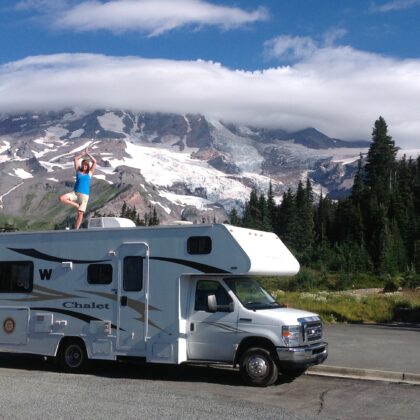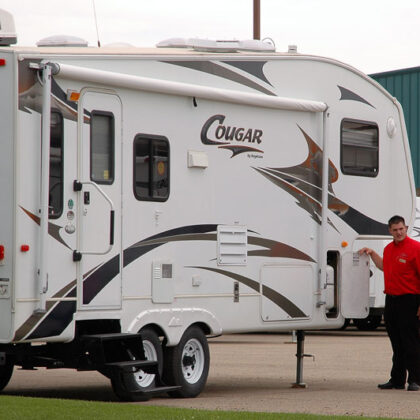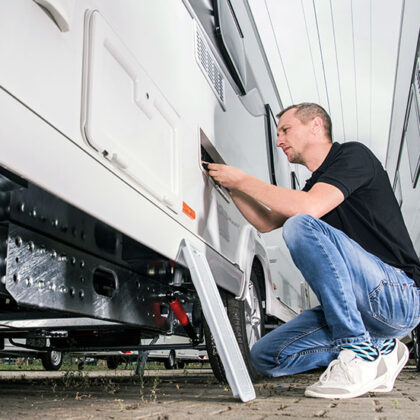Whether they run a business from their RV, or just like to surf the Internet and watch cat videos, having a strong, stable internet connection is important for many Workampers.
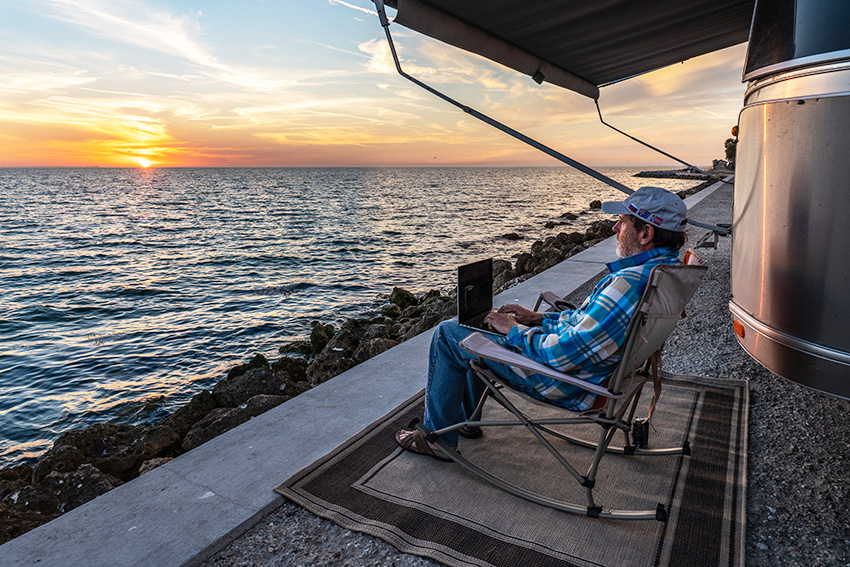
by Greg Gerber
The good news is there are more options today than ever before. When I was full-time RVing from 2014 to 2017, people were paying hundreds of dollars for cellular plans offering just 40 gigabytes of data per month. That’s enough to stream about 20 hours of video content per month at standard resolution, plus use email and spend 30 minutes a day on social media.
In the past, campground connections were unreliable, which caused many RVers to rely on the closest cell tower to provide internet service. That often created congestion and reduced data speeds to a crawl.
Ten years later, connecting to the Internet has vastly improved as RVers’ entertainment tastes switched from watching commercial TV shows on cable to consuming their own customized content online. Internet speeds seem to increase exponentially every year as new technology is developed.
Take Starlink for example. Elon Musk’s company launched more than 6,000 satellites to provide relatively high-speed internet service virtually anywhere. In fact, Starlink announced plans to boost that number up to an incredible 34,400 satellites in the future.
As of May 2024, more than 3 million people rely on the satellite network for daily internet service. However, other options exist for quality connections.
Technology Evolution
Eric Johnson, co-owner of TechnoRV since 2015, has been on the cutting edge of the Internet revolution for many years. His company has supplied equipment, such as antennas, routers and signal boosters, in addition to RV power cords, surge protectors, tire pressure monitoring systems and dozens of other gadgets that improve life on the road.
In addition, TechnoRV also offers its own data plans to RVers that are ideally-suited to connecting people while they are traveling. Most of the equipment the company sells is designed to tap into cellular networks; however, TechnoRV’s best systems enable people to seamlessly use cellular, Wi-Fi and satellite connections.
“My wife, Tami, and I have used cellular service for many years to operate our business from the road and to stay connected to friends and family,” Eric explained. “There are so many cellular towers in place today that coverage is often good and reliable. In fact, in six years of full-time travel, I can only recall one time when we didn’t have coverage, and that was while traveling in rural Oregon.”
He said campground connections greatly improved because RV parks upgraded their equipment to not only accommodate more people wanting internet service while camping, but also to better connect all the devices they bring with them in their RVs.
Think about it. Most people have at least one cell phone, a laptop and tablet – all of which require internet connections. Add in streaming devices, like Roku and AppleTV, and the demand for data at campgrounds is very high.
“Back in the day, most RVers were interested in whether the campground offered a pool and laundry facilities, but today, that has turned into, “Do you have good Wi-Fi?” he explained. “In the past, RVers relied on puck-like devices to create wireless hotspots in their RVs. The antennas in them worked okay, but could be better, so we sold equipment like WeBoost to enhance cellular signals and make them stronger.
“Today, we sell Pepwave routers that enable people to tap into campground Wi-Fi, 4G and 5G cellular connections or even plugin a Starlink receiver,” Eric said. “The Pepwave routers seamlessly tap into multiple signal bands, which increase options by automatically connecting users to whatever signal is strongest.”
Data Plans
All RVers need today is a data plan from a cell provider to connect devices to the Internet. Most cell companies offer data plans that range from $30 to $55 per month, per device, for what the firm calls “unlimited” service.
But, many RVers have discovered limits to “unlimited” plans. The data streams quite fast until it reaches a certain level. At that point, the companies begin to throttle-back the speed. So, while users technically have access to “unlimited” data, it could arrive at dial-up speeds, which renders streaming useless.
TechnoRV developed its own data plans that are designed for RVers who like to stream as well as Workampers who may need a lot of data to run businesses or work remote jobs.
Prices start at $129 per month for 300 gigabytes of data delivered at 25 megabits per second. Enhanced plans cost $289 per month for 650 gigabytes spread over three cell networks. The more expensive plan requires use of a Pepwave router capable of supporting three separate SIM cards needed to connect to each specific company’s towers.
Best of all, TechnoRV’s service does not require a contract. Because service is month-to-month, RVers can pause or cancel service at any time.
“We have to work a lot on our computers to keep TechnoRV running and to stream entertainment in the evenings,” Eric said. “I do not recall ever using more than 300 gigabytes of data in a single month.
“TechnoRV has a contract with Verizon and T-Mobile, so our customers are buying data from our account. It’s perfectly legal and there is no fear of having service cut off,” he added.
With the Pepwave router, users can configure the device to select one source as the priority service to be used when possible. That’s a big benefit for remote workers and business owners because, when data is required for important meetings or to meet deadlines, users have multiple options to maintain an unbreakable connection, Eric explained.
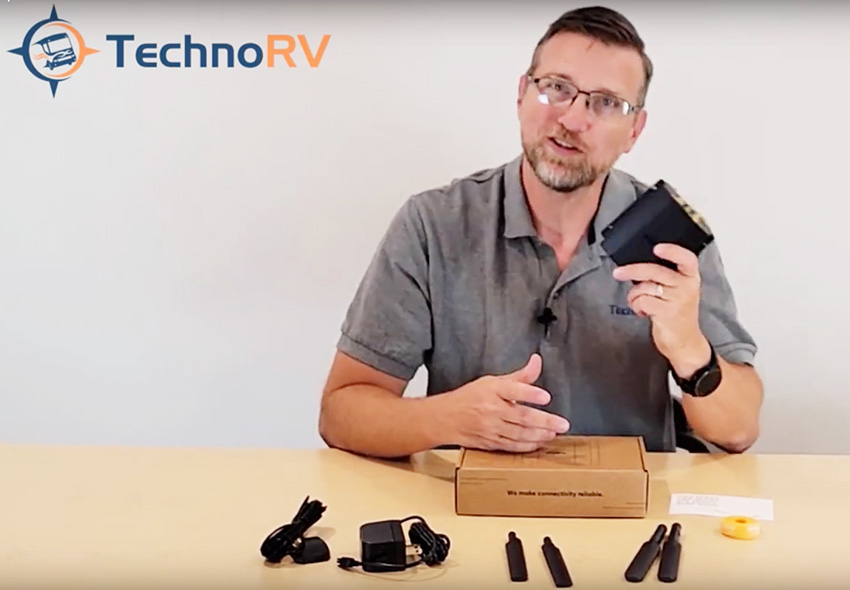
Channeling the Stars
Starlink has been a life-saver for many RVers by providing around-the-clock coverage from almost anywhere. The only real hindrance to establishing a Starlink connection is tree cover. Yet, users can be at the beach, in the desert, or boondocking in the middle of nowhere and still connect to the Internet.
People seeking to establish Starlink service for personal use can do so for $150 per month, which includes unlimited roaming data, but the vehicle must be parked or moving less than 10 miles per hour to maintain the connection.
For people who desire internet when traveling down the road, Starlink offers a mobile plan to RVers that was originally created with boats in mind. There are three plans, and each includes unlimited data when parked inland; however, the cost for data that can be accessed when moving at higher speeds range from $250 per month for 50 gigabytes of mobile data to $1,000 a month for 1 terabyte of data.
Other plans are also available for business use. The prices are higher, but includes monthly data limits ranging from 40 gigabytes to 5 terabytes.
Every Starlink plan requires special equipment to connect to the satellite network. A portable receiver that is usually set up somewhere outside the RV and requires a 20-foot cable to deliver data inside, sells for $599. A flat receiver, which mounts to the roof and is required to use mobile plans, starts at $2,500.
More information about Starlink equipment and service plans can be found at www.starlink.com.
Hardware Options
Equipment is considerably less costly for RVers content to connect to campground Wi-Fi and cellular services.
While it is often possible to create a mobile hotspot using a smartphone, those type of connections are not really designed for long-term use, Eric explained. It’s also difficult for the phone to serve as a router to connect multiple devices.
Cell companies still sell the hot spot devices, which enable multiple connections to laptops, tablets and phones. The downfall is the devices are not built for full-time use. Keeping them plugged in and powered on all day, every day causes the batteries to wear out quickly.
Eric said it’s usually better for Workampers to connect to a dedicated router in their RV. That way they can maintain a constant source of internet service for devices.
TechnoRV has researched a variety of equipment and settled on the Pepwave routers as the only ones the company sells. Eric said he likes those routers for their durability, speed, and reliability. Each Pepwave router has at least one modem in it, and some have two.
“I really like the Pepwave devices because they are easy to use. When you get to a campground, you don’t have to get equipment out, stretch cables or log in to individual devices,” he explained. “Once the Pepwave router is powered on, it automatically establishes connections to cell service and, if enabled, the strongest campground Wi-Fi signal.”
If the campground has a hard-wired ethernet connection at an RV site, Workampers need only connect a cable from the pole to the Pepwave router in order to take advantage of that service. The same is true if the RVers are using Starlink.

Technical Support
Because setting up equipment can be a challenge for many RVers, TechnoRV sets up Pepwave routers before they are shipped. All customers need to do is unpack the equipment and plug it in. The TechnoRV staff has already configured the cellular connections so they will automatically look for and connect to the closest towers.
The routers start at $349 for a device with one modem, two 4G cellular connections and the ability to deliver data at 300 megabits per second. The most advanced router sells for $999, but it includes two modems, four 4G or 5G cellular connections, dual-band local Wi-Fi, and data speeds hovering around 1 gigabits per second.
“When you order a Pepwave router from us and use one of our data plans, you can request that we set up everything for you at no additional cost,” Eric said. “That way, when you get it, all you need to do is plug in the router and start using it.
“Of course, you can always set up the Pepwave router yourself. If you ever have a problem with the equipment, you can just call us and we’ll remotely fix it for you at no extra cost,” he added.
Best of all, when people call for service, they are speaking directly with a TechnoRV employee, not an overseas tech support agent who may be difficult to understand.
To keep costs low, TechnoRV’s support is not available around the clock.
“We’ve got to give our employees some time off from time-to-time,” Eric said. “We are usually available Monday through Friday, but people can submit help requests via our website anytime and we’ll respond on the next business day.”
TechoRV has produced a comprehensive guide to mobile internet connections. It is available free at technorv.com/pages/guides. Free guides are also available for electric safety, navigation, tire safety, propane safety, water filtration and other topics.
For more information about TechnoRV, visit technorv.com or connect with them on Facebook.
Eric has produced more than 160 videos about various equipment designed to improve the RV lifestyle. They can be found on the company’s YouTube channel.
Thanks for reading the Gone Workamping blog from Workamper News. Join Workamper.com today to see all the new job opportunities for RVers, as well as the training and resources to confidently find the right Workamping job for you – easily and securely.




